湘教版-英语-九上-Topic 1 .(SectionA要点总结)
湘教版-英语-九上- Topic 1 Pollution causes(SectionA教案)
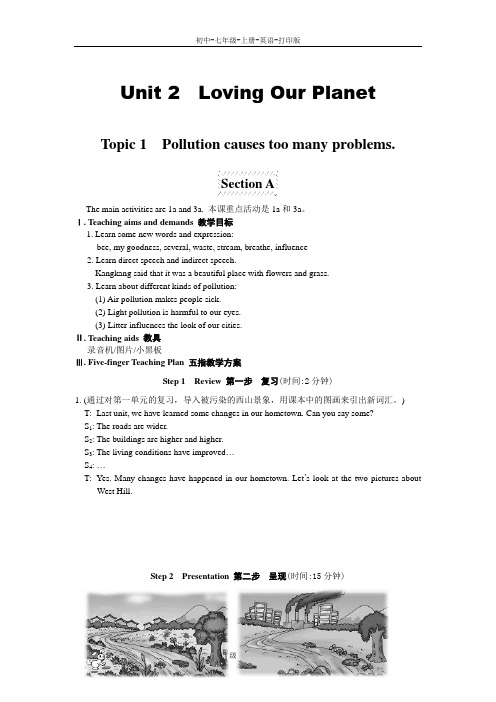
Unit 2 Loving Our Planet Topic 1 Pollution causes too many problems.Section AThe main activities are 1a and 3a. 本课重点活动是1a和3a。
Ⅰ. Teaching aims and demands 教学目标1. Learn some new words and expression:bee, my goodness, several, waste, stream, breathe, influence2. Learn direct speech and indirect speech.Kangkang said that it was a beautiful place with flowers and grass.3. Learn about different kinds of pollution:(1) Air pollution makes people sick.(2) Light pollution is harmful to our eyes.(3) Litter influences the look of our cities.Ⅱ. Teaching aids 教具录音机/图片/小黑板Ⅲ. Five-finger Teaching Plan 五指教学方案Step 1 Review 第一步复习(时间:2分钟)1. (通过对第一单元的复习,导入被污染的西山景象,用课本中的图画来引出新词汇。
) T: Last unit, we have learned some changes in our hometown. Can you say some?S1: The roads are wider.S2: The buildings are higher and higher.S3: The living conditions have improved…S4: …T: Yes. Many changes have happened in our hometown. Let’s look at the two pictures about West Hill.Step 2 Presentation 第二步呈现(时间:15分钟)T: Are there any differences between them?Ss: Yes.T: Let’s look at Picture 1. What can you see on West Hill in the past?S5: I can see some flowers and grass.S6: I can see a butterfly dancing.T: Yes, there is a butterfly dancing.S7: I can see a rabbit.S8: I can see some houses.S9: …T: (指着一蜜蜂)What’s it?Ss: 蜜蜂。
湘教版英语九年级词汇总表(上下册)

湘教版英语九年级词汇总表(上下册)Unit 1第1单元Topic 1 Our country has developed rapidly.话题1 我们的国家飞速发展。
properadj.恰当的,合适的;真正的by the way顺便说volunteern.义务工作者;志愿者belln.钟(铃)声;铃,钟;钟状物grandpan.爷爷;外公chairwomann.女主席,女会长;女议长grandsonn.(外)孙子disabledadj.残疾的,残废的shutv.关上,封闭;禁闭;合拢ropen.绳子,绳索teenagern.(13~19岁的)青少年,十几岁的少年grannyn.祖母,外婆;老奶奶describev.描写,叙述in detail详细地educationn.教育;培养childhoodn.童年,幼年时代supportv.&n.供养,抚养;支持,赞助laborern.(尤指户外的)体力劳动者,劳工,工人developv.(使)发展;(使)发达;开发rapidlyadv.快地,迅速地luckilyadv.幸运的developmentn.发展;发达;开发narrowadj.狭窄的communicationn.交流;交往;通讯quickadj.快的;敏捷的;急剧的;adv.快地;敏捷地;急剧地leisuren.空闲,闲暇,业余时间keep in touch with跟……保持联系relativen.亲属,亲戚far away遥远的mainlyadv.主要地,总体上,大致telegramn.电报;电文reform and opening-up改革开放sortn.种类,类别;v.把……分类;拣选faxn.传真;传真机rapidadj.快的,迅速的progressn.进步;进展;v.进展;逐步发展make progress取得进展;取得进步alreadyadv.已经succeedv.成功organizationn.组织,机构warn.战争tug of warn.拔河noten.便条;笔记;注释;钞票,纸币;v.记下,记录;注意,留意compositionn.作文;作曲considerv.考虑draw up拟定,起草tooln.工具,器具thanks to幸亏,由于Unit 1第1单元Topic 2 China has the largest poipulation.话题2 中国拥有最庞大的人口。
湘教版-英语-九上-Topic 1 .(重点单词词组句子归纳)
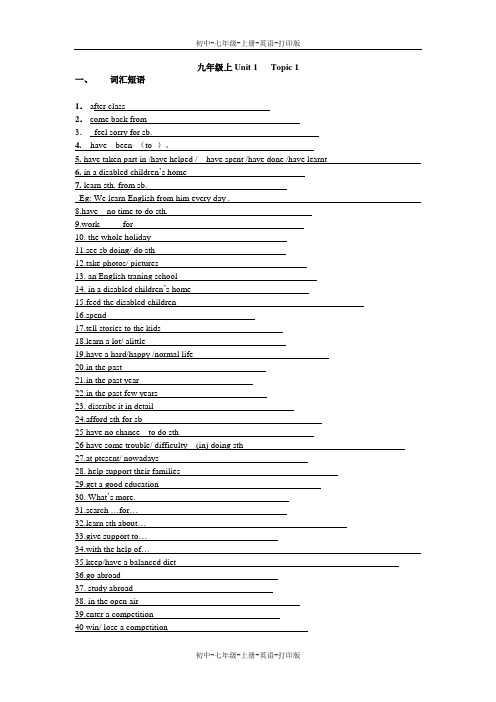
九年级上Unit 1 Topic 1一、词汇短语1.after class2.come back from3.feel sorry for sb.4.have been (to )。
5. have taken part in /have helped / have spent /have done /have learnt6. in a disabled children’s home7. learn sth. from sb.Eg: We learn English from him every day .8.have no time to do sth.9.work -----for---10. the whole holiday11.see sb doing/ do sth12.take photos/ pictures13. an English traning school14. in a disabled children’s home15.feed the disabled children16.spend17.tell stories to the kids18.learn a lot/ alittle19.have a hard/happy /normal life20.in the past21.in the past year22.in the past few years23. discribe it in detail24.afford sth for sb25 have no chance to do sth26 have some trouble/ difficulty (in) doing sth27.at ptesent/ nowadays28. help support their families29.get a good education30. What’s more.31.search …for…32.learn sth about…33.give support to…34.with the help of…35.keep/have a balanced diet36.go abroad37. study abroad38. in the open air39.enter a competition40 win/ lose a competition41.write a lettered to do sth43 get/be used to doing sth44. be used to do sth45.one…., the other…46. some……, others…47.on the other hand48 on the other side of..49. at sunrise50. fall ill51 send …to…52. elder brother53 .be cruel for sb54.at that time/ moment55. feel/ be satisfied with…56. happen/ take place57 What happened to sb?58.dream of/ about…59.in the future6.in recent years61. in the past62.ring roads63.living conditions64.thanks to..65 .stand for…66.prepare for/ get ready for..67. welcome to….68. consider doing sth69. manage to do sth.70.Is that so ?71. consider …as…72. plant crops73. draw up…74.have gone to75. have been to..76. have been in….(for…)1.One World, One Dream 2.Thanks to the government’s efforts 3.the capital of---4.. the rich culture of china5.as well6.with the help of =with one’s help.7.divide my money into two parts.8. at that time/on that day9. --enough--- to do sth.10.made such rapid progress11. write an article about12.the Chinese teenagers’ lives二、重点句子1.Did you have a good summer holiday?2.How was your trip?3.In one place I saw children working for a cruel boss.4.I felt sorry for them.5.A: Where have you been, Jane?B: I have been to Mount Huang with my parents.6.A: Where has he/she / kangkang been?B: He has been to an English training school to improve his English.7.There goes the bell。
湘教版-英语-九上-Topic1 .(SectionA训练题及答案)
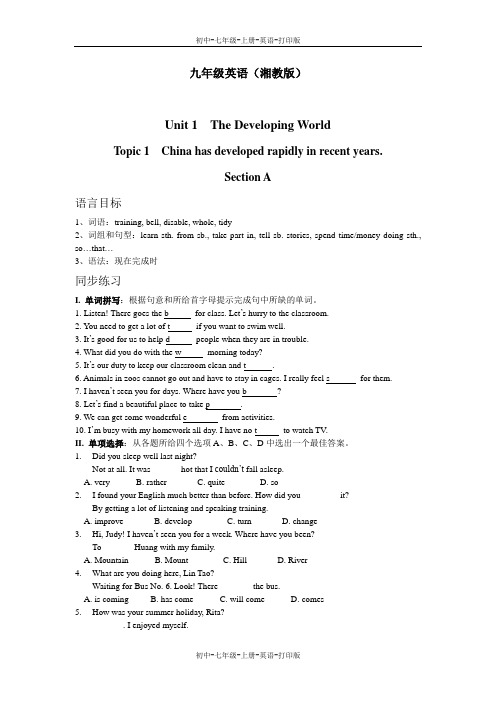
九年级英语(湘教版)Unit 1 The Developing WorldTopic 1 China has developed rapidly in recent years.Section A语言目标1、词语:training, bell, disable, whole, tidy2、词组和句型:learn sth. from sb., take part in, tell sb. stories, spend time/money doing sth., so…that…3、语法:现在完成时同步练习I. 单词拼写:根据句意和所给首字母提示完成句中所缺的单词。
1. Listen! There goes the b for class. Let’s hurry to the classroom.2. You need to get a lot of t if you want to swim well.3. It’s good for us to help d people when they are in trouble.4. What did you do with the w morning today?5. It’s our duty to keep our classroom clean and t .6. Animals in zoos cannot go out and have to stay in cages. I really feel s __ for them.7. I haven’t seen you for days. Where have you b ?8. Let’s find a beautiful place to take p .9. We can get some wonderful e from activities.10. I’m busy with my homework all day. I have no t to watch TV.II. 单项选择:从各题所给四个选项A、B、C、D中选出一个最佳答案。
湘教版-英语-九上-Topic 1 .(克服母语)

怎样在课堂教学环节帮助学生摆脱“母语情节”――浅谈英语教学中的文化渗透英语科:谢世琼摘要:英语作为一种语言是一种工具,更是一种文化。
语言反映一个民族的特征,它不仅包含着该民族的历史和文化背景,而且蕴藏着该民族对人生的看法、生活方式和思维方式。
所以学习英语也就要了解其语言本身的文化,就要有英语思维能力。
在英语课堂教学的各个环节中老师要有意识地渗透西方文化,培养学生的英语思维能力。
关键词:母语情节,文化渗透,英语思维,课堂教学环节语言反映一个民族的特征,它不仅包含着该民族的历史和文化背景,而且蕴藏着该民族对人生的看法、生活方式和思维方式。
透过一个民族的语言,可以窥见该民族绚丽多姿的文化形态。
英语作为一种语言,是一种工具,更是一种文化。
所以学习英语也就要了解其语言本身的文化,学习英语就需要就要有英语思维能力,需要克服“母语情节”。
对于在母语环境影响下学英语的中国人来说,因为两种文化的冲突在很大程度上加大了学习的难度。
第一:文化即风俗习惯方面的冲突会给中国学生学习英语制造障碍。
记得有一天英语课堂上,一位同学在做duty reporter时讲了发生在自己身上的故事—“ a dangerous dog is running after me ,I was so scared. Suddenly the owner of the dog came and saved me…”我在点评时说了一句“you are a lucky dog”.当时全班哄堂大笑,做值日报告的同学也好象很气恼的盯着我。
我突然明白是学生在理解“lucky dog”上出了问题。
因为在中国的传统文化里,dog是是一种卑微的动物。
汉语中与狗有关的习语大都含有贬意:“狐朋狗党”、“狗急跳墙”、“狼心狗肺”、“狗腿子”等。
狗的贬义形象深深地留在汉语言文化中。
而在西方英语国家,狗被认为是人类最忠诚的朋友。
英语中有关狗的习语除了一部分因受其他语言的影响而含有贬义外,大部分都没有贬义。
湘教版-英语-九上-Topic1.
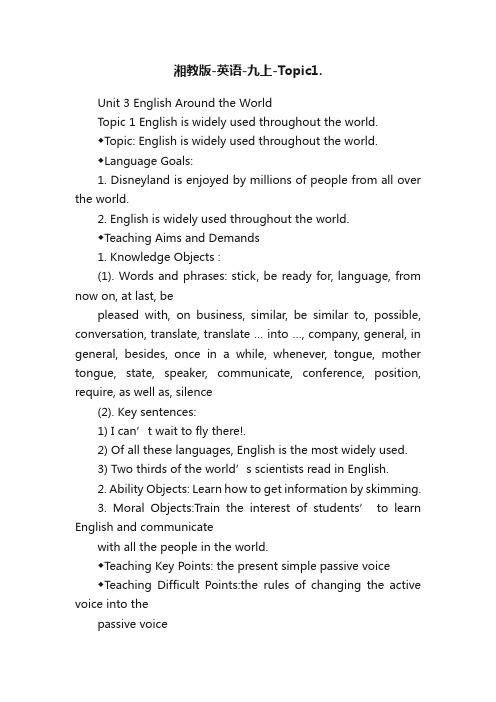
湘教版-英语-九上-Topic1.Unit 3 English Around the WorldTopic 1 English is widely used throughout the world.◆Topic: English is widely used throughout the world.◆Language Goals:1. Disneyland is enjoyed by millions of people from all over the world.2. English is widely used throughout the world.◆Teaching Aims and Demands1. Knowledge Objects :(1). Words and phrases: stick, be ready for, language, from now on, at last, bepleased with, on business, similar, be similar to, possible, conversation, translate, translate … into …, company, general, in general, besides, once in a while, whenever, tongue, mother tongue, state, speaker, communicate, conference, position, require, as well as, silence(2). Key sentences:1) I can’t wait to fly there!.2) Of all these languages, English is the most widely used.3) Two thirds of the world’s scientists read in English.2. Ability Objects: Learn how to get information by skimming.3. Moral Objects:Train the interest of students’ to learn English and communicatewith all the people in the world.◆Teaching Key Points: the present simple passive voice◆Teaching Difficult Points:the rules of changing the active voice into thepassive voice◆Functions:Talking about English around the world◆Teaching Methods:1. Individual, pair or group method to make every student take an active part in theactivities in class.2. Using discussion method to make every student to express himself in English.3. Skimming the text to get a general idea of the text.4. Scanning the text to get specific information◆Teaching Tools: computers, pictures, tape-recorder◆Teaching Design: 4-5 teaching periods◆Vocabulary:stick, language, similar, possible, conversation, translate,company, general, besides, whenever, tongue, state, speaker, communicate, conference, position, require, silence◆Teaching ProceduresSection AKey points:1. Learn the new words and phrases:stick, be ready for, language, from now on, at last, be pleased with2. Learn and master the simple present passive voice.Pre-task (Homework for preview):Get some information about Mickey Mouse, Donald Duck and Disneyland. Teaching Steps:StepⅠ Review1. Review countries, nations and languages.2. According to the table, introduce the new words and phrase: language, throughout, from now on.We speak Chinese.Chinese is spoken by us.Let students observe the difference of the two sentences and encourage them to talk about others in the form using the passive voice.4. Lead to the new lesson.StepⅡ Presentation5. Show pictures of Mickey Mouse and Donald Duck. Talk about them and lead to the new words and phrase: cartoon, character, stick, be ready for.6. Listen to the tape to do 2 and check the answers.7. Talk about Disneyland and lead to 1a.8. Listen to 1a and ask some questions about it.9. Read 1a carefully, then find out important and difficult points. Encourage students to solve problems by themselves, then give the additional explanation.Step Ⅲ Consolidation10. Work 1b alone and check the answers.11. Read 1a in groups and try to act it out in roles. Encourage the group which does well.Step Ⅳ Practice12. Practice the passive voice. Make sentences after the example in 3a.13. Discuss in groups to find out the rules of changing the active voice into the passive voice.14. Write down some sentences and ask students to change them into the passive voice.15. Encourage students to make sentences with the simple present passive voice. StepⅤ Project16. Work in groups. Show some verbs and ask students to review the past participleof the verbs. Then have a competition after a discussion. The group which makes17. Work in groups. Make sentences with the simple present passive voice to describetheir daily life. Then give a report to the class.Homework:1.We’ve learned so much about English spoken around the world. Is it necessary for us to have a good knowledge of English? Do you think English learning should be paid more attention to than Chinese learning? Please write a composition about it.2.Search for the information about the mother tongue in different countries. FindSection BKey points:1.Go on learning the use of the simple present passive voice.2.Learn knowledge about language and culture.Pre-task (Homework for preview):Search for the information about the national flag, the language, famous buildings of other countries ( at least 10 countries ).Teaching Steps:Step Ⅰ Review1.Ask some students to say some sentences in the simple present passive voice.Encourage them to make more examples.2.Show some sentences. Ask students to change thesentences into the simplepresent passive voice.3.Review the method of changing the active voice to the passive voice.4.Make sentences according to the information given in 3. Finish 3 and check theanswers.5.Lead to the new words and phrases.Step Ⅱ Presentation6.Play a game. The teacher gives the explanations while students say the new words.The student who answers first and correctly is the winner.7.Check answers, finish 1b.8.Show some questions about 1a. Listen to 1a and then answer the questions.9.Read 1a. Find out important and difficult points. Encourage students to solveproblems by themselves, then give the additional explanation.Step Ⅲ Consolidation10.Read 1a in pairs. Act it out in roles.11.Show some key words of 1a. Encourage students to try to retell 1a.Step Ⅳ Practice12.Read 2a quickly. Get the main information by skimming.13.Explain some new words and difficult points to help students understand 2a.Step Ⅴ Project14.Finish 2b. Circle the countries where English is spoken as the first language. Thenthe other countries should be written down, using the passive voice. Discuss the importance of English.15.Work in groups. Fill out the form. ( Draw pictures of the flags.) The group whichfinishes it best is the winner.Homework:1.How many languages are there in the world? Which language is the most widelyused? In how many countries do people speak English as the first language?Search for the information and write some sentences with the simple present passive voice.2.Find out on the Internet or from other resources the countries where English isspoken as the first language.Section CKey points:1.Go on learning the use of the simple present passive voice.2.Learn how to get information by skimming.3.Let students know the wide use of English in the world and encourage them tolearn English well.Pre-task (Homework for preview):Find out information about when and where people use English.Teaching Steps:Step Ⅰ Review1.Ask students to report their task last lesson: Find out how many countries in theworld where English is spoken as the first language.2.Sum up: About 70 countries use English as their first language. It’s lear n ed as thesecond language in over 100 countries.Step Ⅱ Presentation3.Talk about the importance of English. Let students know English is widely used inour daily life and encourage them to learn English harder.4.Learn and master the new words and phrases.5.Listen to 1a. Ask some questions about it.Step Ⅲ Consolidation6.Read 1a carefully, underline the topic sentences of each paragraph and then findsome examples in the passage to prove the topic sentence.7.Read 1a again and do 1b. Check the answers.S tep Ⅳ Practice8.Listen to 2 and finish it. Check the answers.Step Ⅴ Project9. Work in groups. Talk about the pictures in 3. Then discuss when and where10. Work in groups. Collect the English signs around us. Choose one of them to makea sign. Show the sign and explain it to the class. The group whose card is drawn bestis the winner.Homework:1.With the development of Great Britain and the U.S.A., English has become aninternational language. Read articles about the history ofGreat Britain and the U.S.A.2.Have you seen any English signs in the school? Make some English signs and putthem in the right places in the school.Section DKey points:1.Review and sum up the simple present passive voice.2.Get to know the history of English becoming the international language.Pre-task (Homework for preview):Find out how English has become the most popular language in the world. Teaching Steps:Step Ⅰ Review1.Review what we learned last lesson by asking and answering.2.Choose 1 or 2 students to retell 1a in Section C.3.Talk about the history of Great Britain and the U. S. A. Lead to the new section. Step Ⅱ Presentation4.Listen to 1a. Ask some questions about 1a.5.Read 1a carefully. Find out the new words and phrases. Try to understand them inthe passage.6.Give the additional explanation.Step Ⅲ Consolidation7.Read 1a again, find out the key sentences and learn about the history of English.8.Work in groups. Discuss how English has become the most popular language inthe world. Talk about the main stages in the development of English.9.Each group should give a report.10.Finish 1b, then check the answers.Step Ⅳ Practice11.Review the simple present passive voice. Read 2a.12.Read 2b together. Sum up more target expressions and sentences in the top ic. Step Ⅴ Project13.Which language will be most widely used in the future, Chinese or English? Why?English. Hold a debate competition.Homework:English is used all over the world. But do you think English is important in our daily life? As a student, is English useful to you? What do you learn English for? Write a short passage about the importance of English.教学反思:本话题的中心内容是谈论英语学习的重要性以及英语的广泛应用,以谈论迪斯尼乐园为切入点,进而过渡到英语语言的应用,围绕英语的应用展开话题。
湘教版-英语-九上- Topic 1 Pollution causes(SectionA教案)
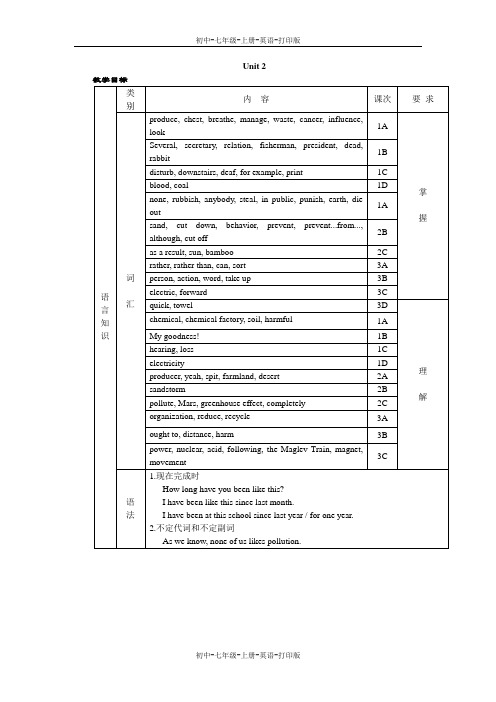
Unit 2Section AThe main activities are 1a and 3a. 本课重点活动是1a和3a。
Ⅰ. Teaching aims and demands教学目标1. Master some new words and useful expressions:produce, chest, breathe, manage, waste, cancer, influence, look2. Learn the present perfect tense with for/since:— How long have you been like this?— I have been like this since last month.3. Learn something about some kinds of pollution:(1)The large population has caused many problems.(2)Air pollution makes people sick.(3)Light pollution is harmful to our eyes.(4)Litter influences the look of our cities.4. Let students know that pollution is really a serious problem.Ⅱ. Teaching aids教具录音机/本课图片/当地有关环境变化的图片Ⅲ. Five -finger Teaching Plan 五指教学方案Step 1 Review 第一步复习(时间:10分钟)1.(为了引导学生说出有关环境污染的话题,可用家乡变化的图片或联系居住的周围环境,采用问答的方式,让学生自己说出图片中所有的环境变化或居住地的环境变化。
)T: Now please look at these pictures. Would you like to say something about the environment around us?Pleaseanswer my questions.No.1. Where do you live?And are you living in the countryside or in town?No.2. Are there any changes in your village/town/city?(What changes have taken place in your village…?)(教师注意引导学生说出工厂的建立,树木的减少等。
九年级英语Unit 1 Topic 1 Our country has developed rapidly. 湘教版
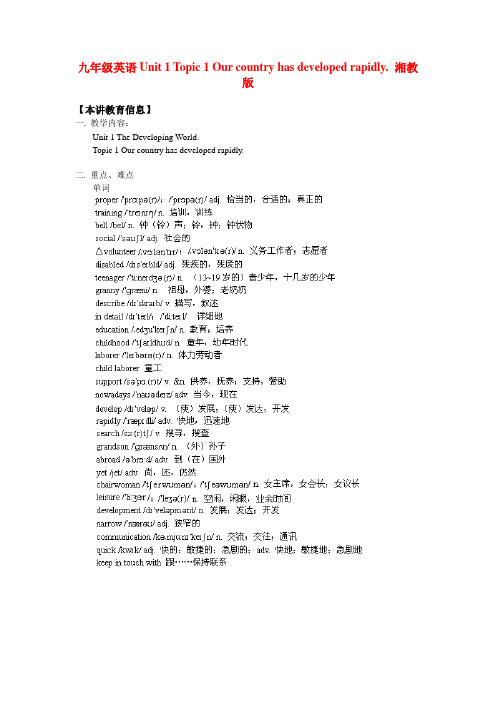
九年级英语Unit 1 Topic 1 Our country has developed rapidly. 湘教版【本讲教育信息】一. 教学内容:Unit 1 The Developing World.Topic 1 Our country has developed rapidly.二. 重点、难点单词短语:feel sorry for the whole holiday learn… from …have a hard life in the past in detailgive support to…search…for…with the development ofkeep in touch with sorts of make progressdream about make preparations for slogan formascots for draw up thanks to句子讲解:Section A1. Rita, you have just come back from your hometown.丽塔,你刚刚从你的家乡返回。
此句为现在完成时态。
现在完成时由“助动词have/ has+ 动词的过去分词”构成,表示过去发生或已经完成的某一动作对现在造成的影响或结果,可与just,already,ever,never,yet等表示时间的副词连用。
如:She has just told me the news. 她刚刚告诉我那个消息。
I have already finished my homework. 我已经做完作业了。
Have you ever spoken to a foreigner? 你曾和外国人交谈过吗?My father hasn’t come back yet. 我爸爸还没有回来。
2. In one place I saw children working for a cruel boss. 在一个地方我看到孩子们正为一个残忍的老板干活。
湘教版-英语-九上-Topic 1 .(重点词组及句型)
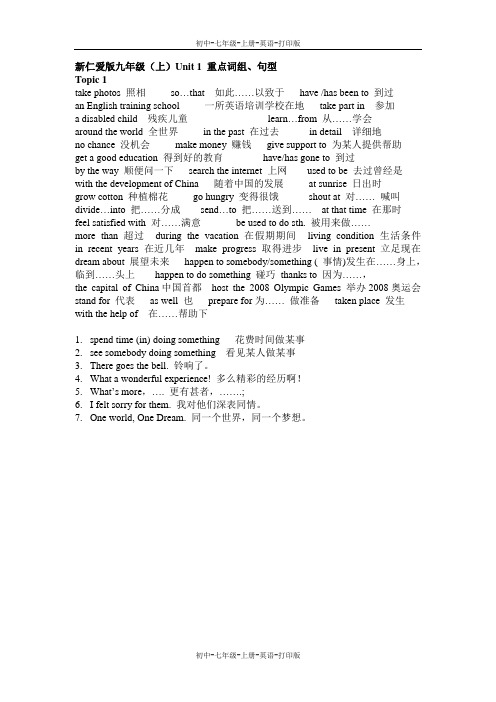
初中-七年级-上册-英语-打印版新仁爱版九年级(上)Unit 1 重点词组、句型Topic 1take photos 照相so…that 如此……以致于have /has been to 到过an English training school 一所英语培训学校在地take part in 参加a disabled child 残疾儿童learn…from 从……学会around the world 全世界in the past 在过去in detail 详细地no chance 没机会make money 赚钱give support to 为某人提供帮助get a good education 得到好的教育have/has gone to 到过by the way 顺便问一下search the internet 上网used to be 去过曾经是with the development of China 随着中国的发展at sunrise 日出时grow cotton 种植棉花go hungry 变得很饿shout at 对……喊叫divide…into 把……分成send…to 把……送到……at that time 在那时feel satisfied with 对……满意be used to do sth. 被用来做……more than 超过during the vacation 在假期期间living condition 生活条件in recent years 在近几年make progress 取得进步live in present 立足现在dream about 展望未来happen to somebody/something ( 事情)发生在……身上,临到……头上happen to do something 碰巧thanks to 因为……,the capital of China中国首都host the 2008 Olympic Games 举办2008奥运会stand for 代表as well 也prepare for为……做准备taken place 发生with the help of 在……帮助下1.spend time (in) doing something 花费时间做某事2.see somebody doing something 看见某人做某事3.There goes the bell. 铃响了。
湘教版-英语-九上-Topic 1 .(SectionA学案)

仁爱版9年级上Unit 3 Topic 1 Section A学案一.学习内容1.Kangkang 等四人的对话,学习了解Disneyland和英语的使用的话题。
2.学习被动语态。
二、学习要求1.重点单词和短语Stick to, one day, can’t wait to do, be ready for, practice doing sth, language, Throughout the world, from now on, character.2.主要句型(1) I will able to see more cartoon characters.(2) Disneyland is enjoyed by millions of people from all over the world.(3) I can’t wait to fly there1(4) you’ll have a good chance to practice speaking English there.(5) English is spoken as the first language in America三、本节课的学习要点及考点重点句型:1.You can stick it on the wall in your room. 你可以把他粘在你房间的墙上.Stick v. 粘住Please stick this picture on the wall. 请把这幅画粘在墙上。
Stick to +n 坚持,坚守某种观点,主张He sticks to his decision. 他坚持自己的决定。
Stick to doing sth. 坚持做某事She sticks to running every morning. 她坚持每天早上跑步。
n. 木棍,枝条walking stick 手杖2. I can’t wait to fly there. 我迫不及待地想飞到那儿去了。
湘教版-英语-九上-Topic 1 (SectionA教案) (3)

Unit 1 教学目标语言知识类别内容语法1.现在完成时You have just come back from your hometown.Where have you been, Jane?I have been to Mount Huang with my parents.Have you ever fed the disabled children?Yes, I have. / No, I haven’t.I’ve just tried to call you.Have you found him yet?Yes, he has already gone home.Has he ever been abroad?2.直接引语和间接引语“What are you reading, Jane?” Maria asked.Maria asked Jane what she was reading.Jane said, “I’m reading a newspaper from Canada.”Jane said that she was reading a newspaper from Canada.“Are there homeless people in Canada?”Maria asked Jane.Maria asked Jane if there were homeless people in Canada.3.构词法(1)合成法:filmmaker, granddaughter, friendship, fireplace(2)派生法:disobey, rewrite, impossible, unhappy, laborer, peaceful,homelessness, snowy, exciting, rapidly功能和话题1.谈论假期发生的事情。
2.谈论社会环境发生的变化。
湘教版-英语-九上- Topic 1 .(SectionA教案) (3)

Unit 3 English around the WorldTopic 1Section A The main activities are 1a and 2. 本课重点活动是1a和2。
Ⅰ.Teaching aims and demands 教学目标1.Master some new words and useful expressions:stick, language, communication, communicate2.Help the students to learn the usage of present simple passive.(1)Disneyland is enjoyed by millions of people from all over the world.(2)English is widely spoken around the world now.(3)It is also spoken as a second language in many countries.3.Talk about the wide usage of EnglishⅡ.Teaching aids 教具一些写有动词的卡片/一些内容适合练习被动语态的图片/录音机Ⅲ.Five-finger Teaching Plan 五指教学方案Step 1 Review 第一步复习(时间10分钟)1.(呈现一些写有动词的卡片,贴于黑板上,复习过去分词,动词的选用要能体现过去分词的多种变化规则。
)T: Nice to see you again. Today we’ll go to a new topic. First let’s look at the verbs on the cards. Do you know these words?Ss: Yes.T: OK! Tell me the past participles of these words. Begin with Card 1.S1, can you tell me the past participle of “speak”?S1: Yes. It’s “spoken”.T: Can you spell it, please?S1: Yes. S-P-O-K-E-N,spoken.T: Good! Sit down, please!(教师以同样的方式复习完所备卡片上的动词。
湘教版-英语-九上-Topic 1 .(语言点)
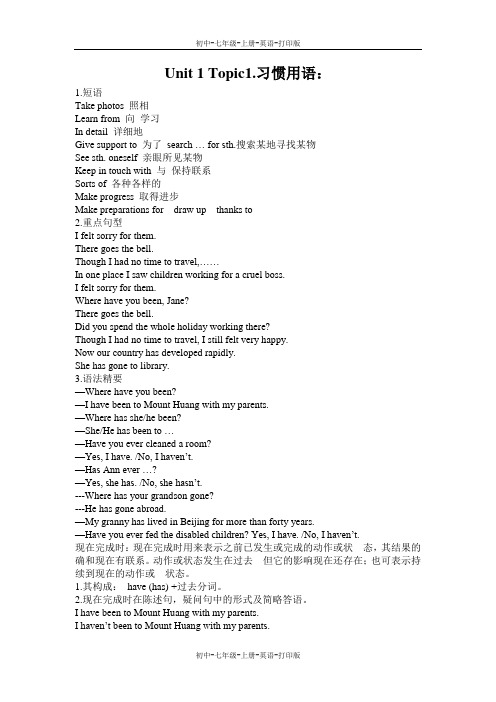
Unit 1 Topic1.习惯用语:1.短语Take photos 照相Learn from 向学习In detail 详细地Give support to 为了search … for sth.搜索某地寻找某物See sth. oneself 亲眼所见某物Keep in touch with 与保持联系Sorts of 各种各样的Make progress 取得进步Make preparations for draw up thanks to2.重点句型I felt sorry for them.There goes the bell.Though I had no time to travel,……In one place I saw children working for a cruel boss.I felt sorry for them.Where have you been, Jane?There goes the bell.Did you spend the whole holiday working there?Though I had no time to travel, I still felt very happy.Now our country has developed rapidly.She has gone to library.3.语法精要—Where have you been?—I have been to Mount Huang with my parents.—Where has she/he been?—She/He has been to …—Have you ever cleaned a room?—Yes, I have. /No, I haven’t.—Has Ann ever …?—Yes, she has. /No, she hasn’t.---Where has your grandson gone?---He has gone abroad.—My granny has lived in Beijing for more than forty years.—Have you ever fed the disabled children? Yes, I have. /No, I haven’t.现在完成时:现在完成时用来表示之前已发生或完成的动作或状态,其结果的确和现在有联系。
湘教版-英语-九上-Topic1 (“support”)
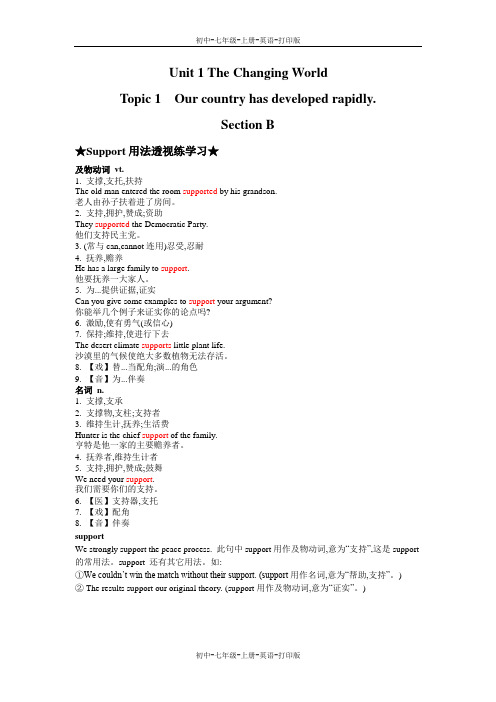
初中-七年级-上册-英语-打印版Unit 1 The Changing WorldTopic 1 Our country has developed rapidly.Section B★Support用法透视练学习★及物动词vt.1. 支撑,支托,扶持The old man entered the room supported by his grandson.老人由孙子扶着进了房间。
2. 支持,拥护,赞成;资助They supported the Democratic Party.他们支持民主党。
3. (常与can,cannot连用)忍受,忍耐4. 抚养,赡养He has a large family to support.他要抚养一大家人。
5. 为...提供证据,证实Can you give some examples to support your argument?你能举几个例子来证实你的论点吗?6. 激励,使有勇气(或信心)7. 保持;维持,使进行下去The desert climate supports little plant life.沙漠里的气候使绝大多数植物无法存活。
8. 【戏】替...当配角;演...的角色9. 【音】为...伴奏名词n.1. 支撑,支承2. 支撑物,支柱;支持者3. 维持生计,抚养;生活费Hunter is the chief support of the family.亨特是他一家的主要赡养者。
4. 抚养者,维持生计者5. 支持,拥护,赞成;鼓舞We need your support.我们需要你们的支持。
6. 【医】支持器,支托7. 【戏】配角8. 【音】伴奏supportWe strongly support the peace process. 此句中support用作及物动词,意为“支持”,这是support 的常用法。
support 还有其它用法。
湘教版-英语-九上-Topic1 .(SectionA课后训练及答案)
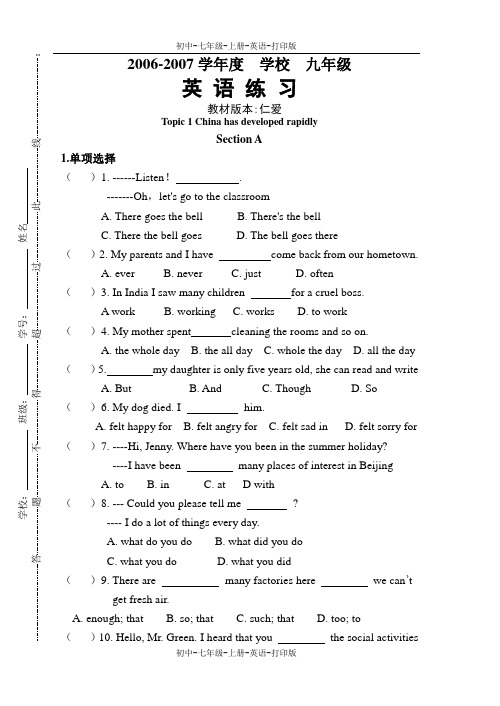
初中-七年级-上册-英语-打印版 2006-2007学年度 学校 九年级 英 语 练 习 教材版本:仁爱 Topic 1 China has developed rapidly Section A 1.单项选择 ( )1. ------Listen ! . -------Oh ,let's go to the classroom A. There goes the bell B. There's the bell C. There the bell goes D. The bell goes there ( )2. My parents and I have come back from our hometown. A. ever B. never C. just D. often ( )3. In India I saw many children for a cruel boss. A work B. working C. works D. to work ( )4. My mother spent cleaning the rooms and so on. A. the whole day B. the all day C. whole the day D. all the day ( )5. my daughter is only five years old, she can read and write A. But B. And C. Though D. So ( )6. My dog died. I him. A. felt happy for B. felt angry for C. felt sad in D. felt sorry for ( )7. ----Hi, Jenny. Where have you been in the summer holiday? ----I have been many places of interest in Beijing A. to B. in C. at D with ( )8. --- Could you please tell me ? ---- I do a lot of things every day. A. what do you do B. what did you do C. what you do D. what you did ( )9. There are many factories here we can ’t get fresh air. A. enough; that B. so; that C. such; that D. too; to ( )10. Hello, Mr. Green. I heard that you the social activities学校: 班级: 学号: 姓名答 题 不 超 过 此 线 :in the summer holiday.A. took part inB. took partC. inD. join二.从方框内选择单词完成对话helping, disabled, learnt, proper, better,wonderful, telling, training, a lot of, didA: Hi, Zhang Lin. Did you have a good summer holiday?B: Just so-so. You know my English is poor. My father helped me find a1 place to study English. I went to an English2 school toimprove my English.A. Not bad. Ithink your English will be 3 soon.B: Thank you. How about you ?A: Well, Jim, Li Lei, Kate and I spent the whole holiday in a disabled children’s home.B: Wow, you’re great. Could you tell me what you ?A: We did 6 things there, such as feeding the 7 children,8 stories to the kids, cleaning the rooms and so on.B:What a 9 experience!A:Yes .it was. I have 10 a lot from it. Though I had no time to travel,I still felt happy this holiday!三.完形填空。
湘教版-英语-九上-Topic 1 .(SectionA辅导)
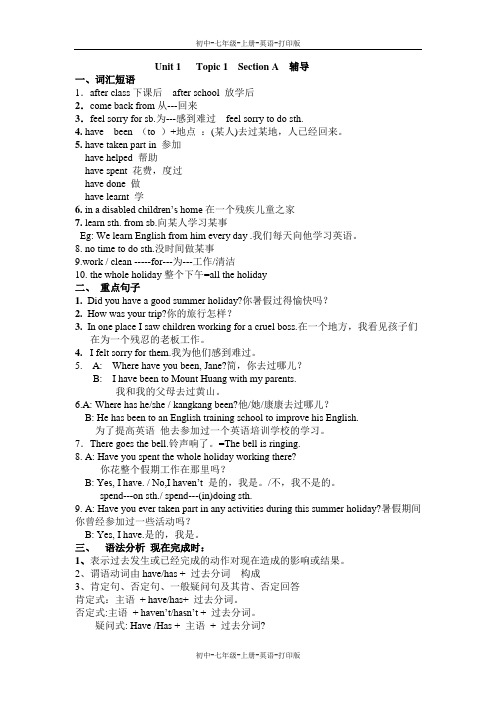
Unit 1 Topic 1 Section A 辅导一、词汇短语1.after class下课后after school 放学后2.come back from从---回来3.feel sorry for sb.为---感到难过feel sorry to do sth.4. have been (to )+地点:(某人)去过某地,人已经回来。
5. have taken part in 参加have helped 帮助have spent 花费,度过have done 做have learnt 学6.in a disabled children’s home在一个残疾儿童之家7. learn sth. from sb.向某人学习某事Eg: We learn English from him every day .我们每天向他学习英语。
8. no time to do sth.没时间做某事9.work / clean -----for---为---工作/清洁10. the whole holiday整个下午=all the holiday二、重点句子1. Did you have a good summer holiday?你暑假过得愉快吗?2. How was your trip?你的旅行怎样?3. In one place I saw children working for a cruel boss.在一个地方,我看见孩子们在为一个残忍的老板工作。
4. I felt sorry for them.我为他们感到难过。
5. A: Where have you been, Jane?简,你去过哪儿?B: I have been to Mount Huang with my parents.我和我的父母去过黄山。
6.A: Where has he/she / kangkang been?他/她/康康去过哪儿?B: He has been to an English training school to improve his English.为了提高英语他去参加过一个英语培训学校的学习。
九年级英语湘教版上 Unit 1 Topic1 Section A课件

somethingtotellher.
B:She____________totheairport
4.A:Whereisyourgrandson?
Ihaven’tseenhimforalongtime.
B:He____________toNewYork.havebeen
Ican’பைடு நூலகம்findhim.
B:Hehasgonetothe
EnglishCorner.
A:WherehaveMariaandher
mothergone?Ican’tfindthem.
B:Theyhavegonetotheshop.
Sb.have/hasgoneto…某人去……了(去而未归)Pairwork1.A:Where
anEnglishsummerschool----
Cuba----volunteer
Choosethebestanswer.
1.––WhereisZhaoMing?Mr.Leeaskshimtogototheoffice.
––He_____theplayground.Heisplayingfootballthere.
4.so…that…Homework1.Read1aaloud.
2.Makesentenceswithhave/has
goneto...andhave/hasbeento...
so…that…
have/hasgoneto
Theregoesthebell.
=That’sthebell.
=Thebellisringing.
Retell1aaccordingtothekeywords.
湘教版-英语-九年级上册-Topic 1 -.(SectionA课件)

2. When and where have you communicated with people in English ?
3. In which countries is English spoken as the first language?
Find the key sentences of passive voice.
4. At last, he was pleased with one of his pictures of the mouse. He called it Mickey Mouse.
Make sentences after the following examples. Disneyland is visited by millions of people from all over the world. English is spoken around the world now.
1. It is also spoken as a second language in many countries.
2. In which countries is English spoken as the first language?
Complete the passage according to 1a.
Review
Review the present simple active voice. Review countries ,nations and languages.
countries China America England France Japan Australia Canada Russia India
湘教版-英语-九上-1单元 Topic 1

3.读1a
第二步:分小组讨论并解决学案中的问题和测试题
第三步:教师抽查小组讨论情况,展示讨论结果
课堂合作学习与探究
1.小组讨论自主学习中遇到的问题
2.在组长的带领下解决自主学习中存在的疑问。
知识与能力
1.通过对新旧社会各种变化的了解,增强学生乐观生活的意识。
2.学习现在完成时的用法。
过程与方法:以自主学习、相互讨论为主,通过练习完成和提高
情感态度与价值观:通过学习,增强学生乐观生活的意识。
重点学习句子:1)Did you hanve a good summer holiday ?
2.Not bad.
_________________________________________________________
6)What a wonderful experience !
________________________________________________________
7)I’ve learnt a lot from it .____________________________________
2.Not bad._______________________________________________
3)You have just come back from your hometown .
________________________________________________________
2)Ihave been a volunteer in a disabled children’s home .
- 1、下载文档前请自行甄别文档内容的完整性,平台不提供额外的编辑、内容补充、找答案等附加服务。
- 2、"仅部分预览"的文档,不可在线预览部分如存在完整性等问题,可反馈申请退款(可完整预览的文档不适用该条件!)。
- 3、如文档侵犯您的权益,请联系客服反馈,我们会尽快为您处理(人工客服工作时间:9:00-18:30)。
Unit 1 Topic 1 Section A
一、词汇短语
1.after class下课后after school 放学后
2.come back from从---回来
3.feel sorry for sb.为---感到难过feel sorry to do sth.
4. have been (to )+地点:(某人)去过某地,人已经回来。
5. have taken part in 参加
have helped 帮助
have spent 花费,度过
have done 做
have learnt 学
6. in a disabled children’s home在一个残疾儿童之家
7. learn sth. from sb.向某人学习某事
Eg: We learn English from him every day .我们每天向他学习英语。
8. no time to do sth.没时间做某事
9.work / clean -----for---为---工作/清洁
10. the whole holiday整个下午=all the holiday
二、重点句子
1.Did you have a good summer holiday?你暑假过得愉快吗?
2.How was your trip?你的旅行怎样?
3.In one place I saw children working for a cruel boss.在一个地方,我看见孩子们在为一个残
忍的老板工作。
4.I felt sorry for them.我为他们感到难过。
5. A: Where have you been, Jane?简,你去过哪儿?
B: I have been to Mount Huang with my parents.
我和我的父母去过黄山。
6.A: Where has he/she / kangkang been?他/她/康康去过哪儿?
B: He has been to an English training school to improve his English.
为了提高英语他去参加过一个英语培训学校的学习。
7.There goes the bell.铃声响了。
=The bell is ringing.
8. A: Have you spent the whole holiday working there?
你花整个假期工作在那里吗?
B: Yes, I have. / No,I haven’t 是的,我是。
/不,我不是的。
spend---on sth./ spend---(in)doing sth.
9. A: Have you ever taken part in any activities during this summer holiday?暑假期间你曾经参加过一些活动吗?
B: Yes, I have.是的,我是。
三、语法分析现在完成时:
1、表示过去发生或已经完成的动作对现在造成的影响或结果。
2、谓语动词由have/has + 过去分词构成
3、肯定句、否定句、一般疑问句及其肯、否定回答
肯定式:主语+ have/has+ 过去分词。
否定式:主语+ haven’t/hasn’t + 过去分词。
疑问式: Have /Has + 主语+ 过去分词?
简略答语: Yes, 主语+ have/has.(肯定回答)
No, 主语+ haven’t/hasn’t.(否定回答)
举例1 :
肯定式:I have spent the whole holiday working there
否定式: I haven’t spent the whole holiday working there
疑问式: Have you spent the whole holiday working there?
简略答语: Yes,I have.(肯定回答)
No,I haven’t.(否定回答)
四、补充其它:
黄山,雄踞于安徽南部。
“五岳归来不看山,黄山归来不看岳” 明代旅行家徐霞客曾这样评价。
传说中华民族的祖先轩辕黄帝在此炼丹并修炼成仙,黄山也因此得名。
黄山,她集合了山的秀美、清丽、幽静、绝胜、险峻等多种特色于一身,以其奇松、怪石、温泉、云海“四绝”闻名于世。
